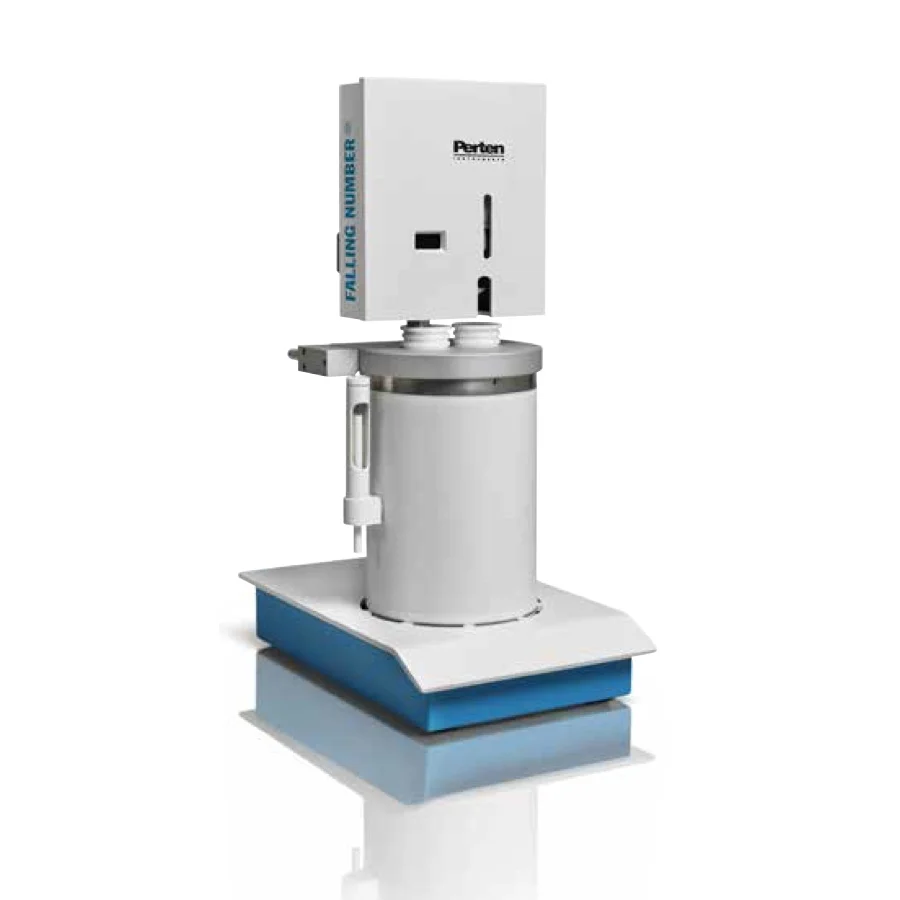Perten Falling Number 1310
Perten Falling Number 1310
If you grow, trade, store or process cereals, the Perten Falling Number 1310 is essential for protecting grain quality and market value.
As the gold standard for falling number testing equipment, it accurately measures alpha-amylase enzyme activity in grain and flour – a critical factor in determining baking, processing and trading suitability.
With one straightforward test, this robust instrument helps you optimise flour enzyme activity, detect sprout damage in wheat and other cereals, and ensure your grain meets global quality standards.
As UK food quality specialists, Calibre Control understands how the right testing transforms operations, making this invaluable for farmers, grain handlers, millers and food producers.
Which foods does a Falling Number (FN) machine test?
A falling number machine is designed to rapidly assess a variety of cereals and grains, helping you make the right quality decisions.
Wheat
Testing helps flour millers and bakers catch sprout damage in wheat early, ensuring their flour consistently produces high-quality bread with good rise and texture.
Rye
Regular testing of rye flours means bakers can trust their dough to perform well and their finished loaves will have the right structure.
Barley
For maltsters and breweries, falling number results reveal enzyme levels that affect fermentability, beer clarity and overall batch yield.
Durum
Crucial for pasta and semolina producers, as controlling enzyme activity is key to achieving firm, non-sticky pasta.
Malted Grains
In malting and distilling, keeping track of falling numbers helps producers maintain optimal conversion rates and flavour development, plus avoid expensive production problems caused by unwanted sprout damage.
What does it measure?
The Perten FN 1310 measures ‘falling number’, an internationally recognised value expressing alpha-amylase enzyme activity.
Often referred to as the Hagberg Method, it works by recording the time, in seconds, for a weighted plunger to fall through a heated slurry of flour (or ground grain) and water.
Low numbers signal high enzyme activity often caused by sprout damage, while high numbers demonstrate sound, undamaged grain.
Why test for alpha-amylase?
Testing for alpha-amylase is essential because it gives you early warning against sprout damage.
A sudden spike in enzyme activity can quickly ruin the quality of your grain, leading to issues such as sticky dough, loaves that won’t rise and pasta that falls apart in the pan.
By regularly checking your grains and flour with a falling number machine like the FN 1310, you can spot these issues before they disrupt your business.
This reduces your risk of having shipments downgraded or rejected, leads to fewer complaints about quality, and gives you confidence that your product will live up to expectations.
Technical specifications of the Perten FN 1310
The Perten FN 1310 is built for accuracy, reliability and straightforward daily use.
Here’s a closer look at the technical details that make it a trusted choice for the grain and food industries.
· Power requirements: 115 or 230 V, 50 or 60 Hz (specify on order)
· Power consumption: Heat-up 1100 VA, running 500 VA
· Dimensions (H x D x W): 525 x 370 x 223 mm
· Net weight: 8kg
· Cooling water consumption: 25 l/h
· Parameters: Alpha-amylase activity/starch properties
· Products: Flour and meal of wheat, durum, rye, barley, other grains and malted cereals
· Calibration: No external calibration required.
· Official approvals: International standards and recommendations such as the AACC International Method 56-81.03 and ICC Standard No. 107/1, ISO 3093.
Benefits of the Perten FN 1310
This piece of falling number testing equipment makes life easier across the grain industry.
Here’s what makes it a genuinely valuable addition to any operation.
· Trusted everywhere: This is the worldwide industry standard for detecting sprout damage in wheat and other grains.
· No fuss for operators: You don’t need a lab expert to use it. Anyone on your team can get reliable results after a quick introduction.
· Consistent every time: Once it’s set up, you can trust the FN 1310 to deliver the same accurate results, test after test.
· Keeps costs low: Built to last with minimal moving parts, this machine rarely needs attention and uses very few consumables.
· Forget frequent calibration: The system is based on simple timing, so there’s no need to constantly calibrate or worry about drifting results.
· Proof of quality: Your customers get clear, reliable data to show your grain is up to standard, helping you achieve better prices and avoid disputes.
· Saves precious time: It works fast with a single analysis stirrer, so you aren’t left hanging around waiting for each result before moving on.
What is the price of a Falling Number machine?
The falling number machine price varies according to the specifications required.
Contact Calibre Control for a bespoke quote matched to your precise needs, including accessories.
How Calibre Control can assist
As leading UK food safety and quality control experts, Calibre Control offers trusted guidance to help you choose the right falling number testing equipment for your business’s needs.
Protect your products, reputation and market value.
Contact Calibre Control today to enquire about the Perten Falling Number 1310 or to order your machine.
FAQs
What does the falling number method test?
It measures alpha-amylase enzyme activity, key for identifying sprout damage and ensuring flour quality.
Can I test whole grain samples?
For best results, grind before testing.
What is sprout damage?
Sprout damage occurs when grains germinate before harvest, elevating enzyme levels and harming end-use quality.
Is it difficult to operate a falling number machine?
No. The FN 1310 is designed to be simple for routine laboratory use with automated processes and intuitive controls.
Does it require frequent calibration?
The FN 1310 is factory calibrated and requires no further calibration.
What’s the difference between FN 1310 and other types of falling number machine?
The FN 1310 stands out for automation, speed, minimal maintenance and official method approval, making it the number one choice for rigorous laboratory and industry needs.

